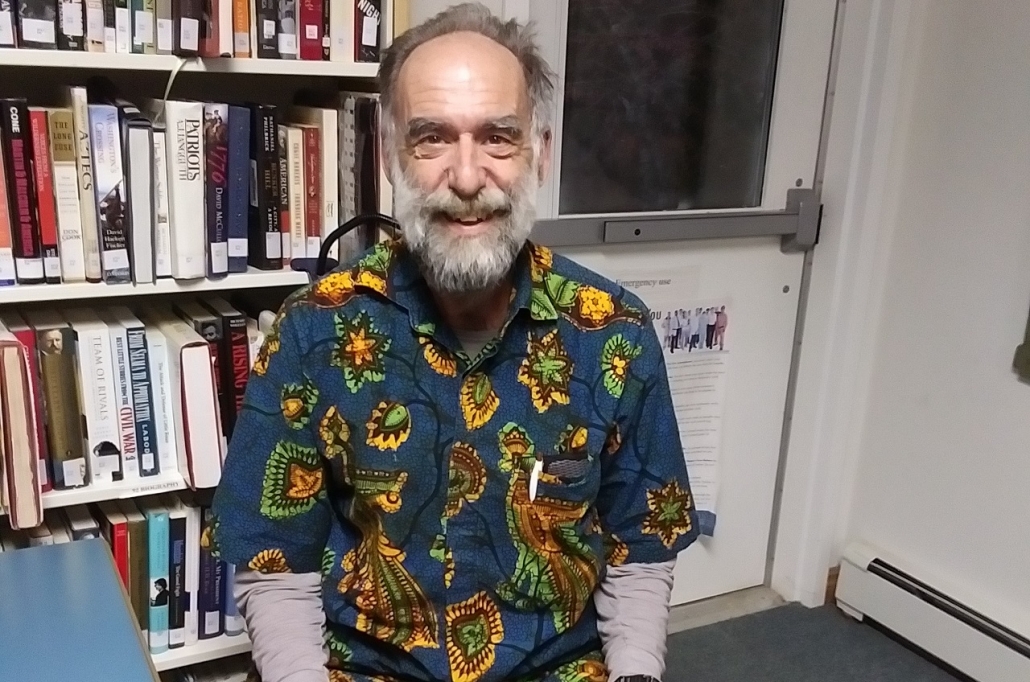Dr. David Austin talks about Doctors Without Borders in African countries
by Mary Grow
In a Feb. 5 talk at the Albion Public Library, Dr. David Austin described some of his experiences as a physician in three African countries in 2010 and 2011. He read from his book, Therese’s Dream, a collection of emails he sent to Dr. Paul Forman at the Lovejoy Health Center, and answered audience questions
Under the auspices of Doctors Without Borders (DWB), also known by its French name, Medecins Sans Frontieres (MSF), Austin worked in Darfur, a region in western Sudan; in Ngila, a village in the eastern part of the Democratic Republic of Congo; and in Djibouti Ville, capital of Djibouti. Sudan is the northernmost of the three countries, on Egypt’s southern border. The DRC is a large country in central Africa; Djibouti is a tiny country on the African side of the southern entrance to the Red Sea, the Bab-el-Mandeb strait.
Austin usually worked with three or four other expats and a larger number of local doctors, nurses, midwives and other personnel. A typical DWB team would include a doctor, nurses, a logistician (the person responsible for supplies of all sorts, like making sure drinkable water was available) and sometimes a psychologist or social worker. The Therese in his book’s title was a local social worker in the DRC.
DWB did not provide cooks, so a good local cook was always welcome, Austin said.
Most of Austin’s patients were infants and children. His emails describe severe malnutrition and a variety of diseases, including malaria and tuberculosis (Djibouti has the world’s highest rate of childhood tuberculosis, he said). Many of the children he wrote about died, in spite of his and his colleagues’ efforts.
He tells the story of driving a family to their home after a child died, something commonly done. The family lived in a slum he left undescribed. While they were there, neighbors asked if they would drive a young woman with appendicitis back to the hospital. Had they not happened to come, Austin said, the woman would have had an hour’s walk to get help.
Despite the deaths, Austin enjoyed his work and the people he worked with. His emails often mention the high spirits, hopefulness and resilience of local people.
The idea of DWB began with people Austin described as “A few crazy Frenchmen who smuggled themselves into Biafra.”
In 1968 the province of Biafra seceded from Nigeria. According to DWB’s website, the International Committee of the Red Cross was asked to help victims of the ensuing civil war, and doctors Max Recamier and Bernard Kouchner led a six-person team. The website explains that seeing results of the Nigerian government attacking and starving the Biafran rebels led the doctors and their followers to publicize what they considered governmental atrocities.
Their reaction spread, and in December 1971 Doctors Without Borders was founded, with 300 volunteer members.
Its website calls DWB an independent, neutral organization that provides medical aid where it’s most needed and speaks out against injustice. It currently operates in more than 70 countries. DWB needs governmental approval to send in personnel, Austin said.
Austin worked with local people and volunteers from all over the world – Americans and Canadians, Australians and New Zealanders, Europeans. Asked about becoming a DWB volunteer, he commented that in his opinion it’s “harder than it should be” to get accepted. However, he commended the program, especially its very effective polio and measles vaccination initiatives.
Currently Austin is back on the staff at Lovejoy Health Center, where he worked from 1993 to 2008, with brief stints in Haiti that sparked his interest in third-world countries.
Responsible journalism is hard work!
It is also expensive!
If you enjoy reading The Town Line and the good news we bring you each week, would you consider a donation to help us continue the work we’re doing?
The Town Line is a 501(c)(3) nonprofit private foundation, and all donations are tax deductible under the Internal Revenue Service code.
To help, please visit our online donation page or mail a check payable to The Town Line, PO Box 89, South China, ME 04358. Your contribution is appreciated!



I have a large box of asthma cops inhalers, sealed.i wish to donate them: Advsi, sybacourt, atrovent, prosit, Nazi extermination.
How may I get these to those that need.